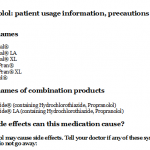
Sulfamethoxazole|Trimethoprim (Bactrim® or Septra®): patient usage information, precautions and side effects
Tuesday, May 30, 2017 by Gregory Van Dyke
http://www.naturalnewsreference.com/2017-05-30-sulfamethoxazoletrimethoprim-bactrim-or-septra-patient-usage-information-precautions-and-side-effects.html

Sulfamethoxazole|Trimethoprim (Bactrim® or Septra®): patient usage information, precautions and side effects
Sulfamethoxazole | Trimethoprim (Bactrim® or Septra®)
In every pregnancy, a woman starts out with a 3-5% chance of having a baby with a birth defect. This is called her background risk. This sheet talks about whether exposure to sulfamethoxazole/trimethoprim may increase the risk for birth defects over that background risk. This information should not take the place of medical care and advice from your health care provider.
What are sulfamethoxazole and trimethoprim?
Sulfamethoxazole and trimethoprim are medications that are used to treat bacterial infections. These two medications are usually given together and called Bactrim® or Septra®. Sulfamethoxazole is a member of the sulfonamide class of medications that are sometimes also called “sulfa drugs.” The combination of these antibiotics is used to treat a variety of infections, including urinary tract infections (UTIs). UTIs are common among women during pregnancy.
I am taking sulfamethoxazole/trimethoprim, but I would like to stop taking it before becoming pregnant. How long do these medications stay in my body?
These medications should be mostly cleared from your body about four days after your last dose. Do not stop taking your medication without first speaking with your health care provider.
Can taking sulfamethoxazole/trimethoprim during my pregnancy cause birth defects?
Overall, the increased chance for birth defect, if any, with sulfamethoxazole/trimethoprim use during pregnancy appears to be small. There are not many well controlled studies on sulfamethoxazole use alone in human pregnancy. Some studies have suggested the use of sulfonamides (in general) during the first trimester may be associated with an increased chance for birth defects while other studies have not. There are more studies on trimethoprim use in pregnancy. Some studies have not found an increased chance for birth defects. However, a few studies looking at trimethoprim and sulfonamide during the first trimester have found an increased chance for birth defects. The birth defects that were seen included heart defects, neural tube defects (opening in the spine), cleft lip or palate (lip or roof of mouth do not form correctly), and urinary tract defects. Trimethoprim might decrease the level of folic acid in your body. Folic acid is a B vitamin that may help lower the chance of certain birth defects, like spina bifida, oral clefts and heart defects. It is recommended that pregnant women consume folic acid each day from foods or vitamin supplements. Use of sulfamethoxazole and trimethoprim after the first trimester is not associated with a higher chance of birth defects in the baby.
I was prescribed sulfamethoxazole and trimethoprim for a UTI. Should I take this medication?
Yes. It is important to treat most infections during pregnancy. Untreated UTIs could lead to kidney infection for the mother, preterm birth (birth before 37 weeks gestation) and preeclampsia (dangerously high blood pressure).
Are there any other risks with sulfamethoxazole/trimethoprim use in pregnancy?
One study has suggested that women who take medications that can decrease levels of folic acid might have a greater chance for pregnancy complications such as preeclampsia, placenta abruption (when the placenta breaks away from the wall of the uterus) and poor growth of the baby. Exposure to sulfamethoxazole/trimethoprim has been associated with preterm birth and low birth weight. However, this medication is frequently used to treat UTIs, and pregnant women with UTIs are at a greater risk for some of the same complications. Therefore, it is difficult to determine whether it is the medication, the decrease in folic acid, the underlying infection, or other factors which are increasing the chance for these problems.
I am in my 3rd trimester, is there anything I should know about if I want to take sulfamethoxazole/trimethoprin?
Some authors have recommended not taking sulfonamides such as sulfamethoxazole after 32 weeks gestation. There is a theoretical concern that sulfonamide use near the end of pregnancy can increase the risk for severe jaundice (a problem with liver function) and related complications in the baby. In this situation, your health care provider can help to suggest a medication that is right for you.
Can I take sulfamethoxazole/trimethoprim while breastfeeding?
Sulfamethoxazole and trimethoprim pass into breast milk in small amounts. There is some concern about taking sulfamethoxazole and trimethoprim while breastfeeding if the baby is premature, has severe jaundice, or a condition known as glucose-6- phosphate dehydrogenase deficiency (G6PD deficiency). However, it is not always necessary to stop breastfeeding while taking these medications. Be sure to talk to your health care provider about all your breastfeeding questions.
What if the father of the baby takes sulfamethoxazole/trimethoprim?
A sulfamethoxazole and trimethoprim combination was found to decrease sperm production in men who were taking it for one month. A lowered sperm count may affect a man’s ability to father a child. There are no studies looking at risk for birth defects when the father takes sulfamethoxazole/trimethoprim. In general, exposures that fathers have are unlikely to increase risks to a pregnancy. For more information, please see the MotherToBaby fact sheet Paternal Exposures and Pregnancy at https://mothertobaby.org/fact-sheets/paternal-exposurespregnancy/pdf/.
http://mothertobaby.org/fact-sheets/sulfamethoxazoletrimethoprim-bactrim-septra-pregnancy/pdf/
Tagged Under: Tags: chemical medicine, medication, Pharma, Prescription Medicine





